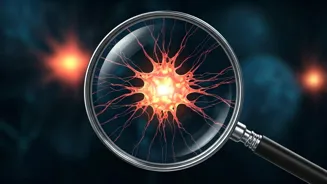Adaptable and Agile
One of the key traits of a genuinely bright person is their ability to swiftly adjust to new situations. They demonstrate a remarkable knack for navigating
unforeseen circumstances, displaying the flexibility to modify plans and strategies as necessary. This adaptability isn't merely about coping; it's about actively seeking out and embracing change. They don't shy away from the unknown. Instead, they see it as an opportunity for growth and learning, demonstrating resilience and a capacity to thrive even when facing unexpected challenges. This flexibility allows them to remain calm under pressure. Their agility makes them excellent problem-solvers in various situations.
Masterful Observation Skills
Highly intelligent individuals possess a keen eye for detail, paying attention to small nuances that others often overlook. They excel at picking up on non-verbal cues, recognizing subtle patterns, and understanding the hidden meanings behind everyday interactions. This meticulous attention to detail is not limited to human behavior; it extends to their environment. They notice subtle changes in surroundings, observe trends, and quickly grasp underlying patterns. Their sharp observational skills allow them to gather information efficiently. This skill enhances their understanding of people and situations, ultimately aiding them in making well-informed decisions and gaining a deeper perspective on the world around them.
Kindness and Confidence
True intelligence goes hand in hand with a balanced sense of self and a generous spirit. Highly intelligent people are often self-assured, yet also demonstrate kindness and empathy in their interactions. They do not feel the need to constantly prove their intelligence. They are comfortable with their abilities. Instead, they focus on contributing positively to their relationships and community. Their confidence is rooted in their knowledge, understanding, and a willingness to acknowledge their own limitations. This blend of confidence and kindness creates a welcoming and supportive environment, encouraging others to share ideas, engage in meaningful conversations, and learn from each other.
Humour as a Tool
Intelligent individuals frequently use humor effectively. They don't just crack jokes; they leverage humor to ease tension, communicate complex ideas, and build connections. They often possess a sophisticated understanding of satire, irony, and wit, using these tools to make their points more memorable and thought-provoking. They are not afraid to laugh at themselves or to use humor to diffuse difficult situations. This ability to find humor in everyday situations reflects a high level of emotional intelligence and the ability to perceive the world from multiple perspectives. The use of humor is not only entertaining; it also reveals creativity, quick thinking, and a deep understanding of human behavior.
Spotting Subtle Patterns
A hallmark of intelligent people is their aptitude for pattern recognition, readily identifying connections and trends that others might miss. They excel at synthesizing information, connecting seemingly disparate pieces of data to uncover a comprehensive picture. This ability to 'connect the dots' helps them solve problems efficiently. Whether it's finding correlations within complex datasets, recognizing behavioral patterns in social situations, or identifying trends in the market, they consistently look beyond the surface. This skill fosters an in-depth understanding of the world, enabling them to anticipate future changes and make informed decisions based on these insights.
Probing Thoughtful Questions
Intelligent individuals are known for asking insightful questions. Instead of accepting things at face value, they seek a deeper understanding. They go beyond surface-level observations. They probe for underlying truths. Their questions are not only meant to gather information, but to spark critical thinking. They want to challenge assumptions, encourage dialogue, and stimulate a richer understanding of the world. The questions they ask are often a reflection of their curiosity and willingness to engage with complex topics. These questions show a thirst for knowledge and a desire to learn and grow. The answers they seek often reveal a greater understanding of the topic.
Listening More, Speaking Less
A characteristic of intelligent people is their preference for active listening over excessive talking. They grasp the value of thoughtful reflection. They understand that listening attentively allows them to gather valuable insights and understand diverse perspectives. They approach conversations with open minds, allowing others to express their views without interruption. This attentiveness provides opportunities for learning and gaining a better understanding. The ability to listen patiently enables them to respond thoughtfully and build stronger relationships. This balance of speaking less and listening more reflects a desire for genuine connection and a deep respect for other people's ideas.
Reacting, Not Responding
Instead of reacting impulsively, intelligent individuals tend to respond thoughtfully and rationally. When confronted with challenges or stressful situations, they carefully evaluate their options before making decisions. This allows them to manage their emotions effectively, making decisions based on reason rather than emotional reactions. They understand the importance of maintaining composure and making the best choice. This ability to respond, rather than simply reacting, shows self-control, self-awareness, and a deep understanding of human nature. This allows them to navigate difficult situations with more grace and create better outcomes.
Lifelong Learning Journey
A constant desire for knowledge and self-improvement characterizes highly intelligent people. They embrace the idea that learning is a continuous journey. They are driven by curiosity, always seeking out new information and experiences. They actively engage in educational pursuits, whether it's formal education, independent study, or experiential learning. They view learning as an integral aspect of their lives, always striving to broaden their knowledge and skills. They understand that personal development is a continuous process. They embrace opportunities to grow, adapt, and refine their understanding of the world.












